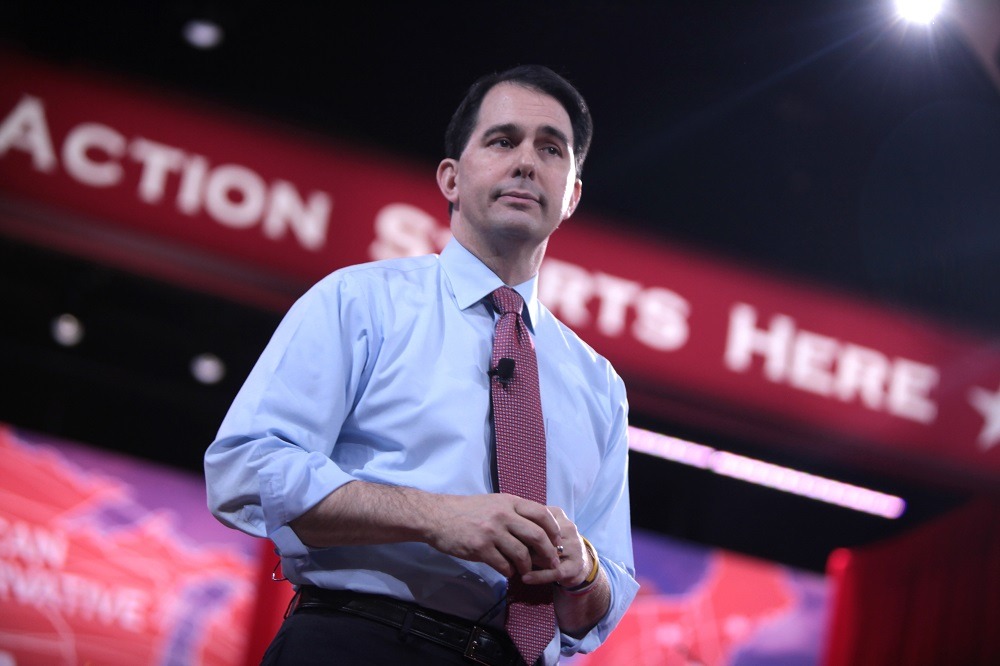
July 10, 2015; The Weekly Standard
Michael Grebe, the president and CEO of the Lynde and Harry Bradley Foundation, is taking over as campaign manager for Scott Walker’s presidential campaign. Given our coverage of the interlocking directorates of the Bradley Foundation and the several Walker campaigns of the past, one wag asked in response to the news, how would we be able to tell that Grebe has joined the campaign? Hasn’t the Scott Walker brain trust been firmly ensconced within the Bradley Foundation’s board of trustees for some time? As we wrote this past April:
“With the multiple arenas of the Bradley Foundation’s public policy funding of Wisconsin’s conservative political model dating back to the administration of Governor Tommy Thompson, including school choice policies and welfare reform, plus Grebe’s history of running Walker’s political campaigns, it would be surprising if Grebe stays aloof from a Walker presidential bid, should that officially emerge.”
Sign up for our free newsletters
Subscribe to NPQ's newsletters to have our top stories delivered directly to your inbox.
By signing up, you agree to our privacy policy and terms of use, and to receive messages from NPQ and our partners.
Our concern back then was how Grebe as the head honcho of the Bradley Foundation might or might not be able to erect a mental firewall between Grebe-as-foundation-CEO and Grebe-as-Scott-Walker-aficionado in his day-to-day activities in the foundation.
With the news that Grebe is relocating himself to the campaign (and presumably, though the article doesn’t say it, taking some sort of leave of absence from the Bradley Foundation), the question flips. How does Grebe-as-Scott-Walker-functionary avoid using his influence with the foundation, even in a minor way, to support the Walker campaign, particularly since the Bradley board retains conservative Republican powerbrokers and political donors such as Cleta Mitchell, Art Pope, Dave Uihlein, and Diane Hendricks, among others, several connected to Walker campaigns in the past?
We suspect that for most humans, insulating their intra-office no-politics requirement from their outside commitments to partisan political activism would require an astounding if not almost impossible degree of mental discipline. While Governor Walker makes his way as one of the fifteen-and-counting Republican presidential candidates of the moment, the Bradley Foundation, if it believes it can really maintain a nonpartisan, non-political stance while Grebe sits astride the Walker campaign apparatus, might want to be extra cautious about grantmaking that might be construed as investing some of the assets and distributions of the 92nd largest foundation in the nation in a partisan campaign effort—if that hasn’t been what has been going on for quite some time. Here’s what the foundation might do if it wanted to keep its skirts out of the campaign puddles:
- For the duration of Walker’s campaign, the Bradley Foundation might be well served to expressly depoliticize its grantmaking and focus on less political, service-oriented groups or higher education recipients or organizations in the arts and culture field. In looking at Bradley’s grants in 2012, there are notable grants to the Milwaukee Symphony Orchestra, City Year, the Milwaukee Zoo, and, although increasingly ideologically conservative but nonetheless generally careful to avoid partisan politics, Teach for America. Typical political grants to Bradley Foundation staples such as the American Legislative Exchange Council, the Cato Institute, the Donors Trust, and the Wisconsin Policy Research Institute, just to name a few of Bradley’s powerhouse conservative regulars, could be put on hold or entirely eschewed until the Walker campaign runs its course.
- Even for grant recipients with no overt connections to the Walker campaign or its key donors, Bradley might want to take an extra due diligence step to ascertain that none of the recipients’ principals are actively engaged in the Walker campaign. Otherwise, as the campaign progresses with Walker-linked groups getting Bradley grants, there is no question that someone will suggest that the foundation is indirectly supporting the campaign through grants to organizations containing pro-Walker people in key positions.
- Unlike its past grantmaking forays, the foundation should be doubly certain that none of its philanthropic largesse ends up behind the programs of organizations engaged in political hijinks. Remember that in the past, Bradley dollars went, directly or indirectly, to groups trying to suppress black voter turnout. That kind of grant support not only takes the foundation down the road of partisan political engagement but actually perverts and harms whatever might be left of the value of fairness in American electoral democracy.
When a foundation’s top echelon is so fully immersed in a partisan political campaign that it is difficult to figure out where the foundation stops and the campaign starts, the problem isn’t just that foundation. The American public might reasonably find the situation as contributing to an increasing suspicion that big money finds its way into partisan political campaigns even when the government rules call for a separation of philanthropy and campaigns.—Rick Cohen













